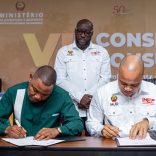Mozambique: Real GDP growth projected to 2.7% in 2025 and 3.5% in 2026 " pushed by rebound in ...
Mozambique: Monitoring Forum urges “deep reforms” in 2018 Draft State Budget

The Mozambican Budget Monitoring Forum (FMO) yesterday recommended that the government make “deep reforms” in the proposed 2018 State Budget, which it considers to be “unfair”.
The FMO advocates “deep reform on the revenue side,” and “extinguishing tax exemptions on megaprojects” in the natural resources exploitation sector. On the expenditure side, it recommends a comprehensive review of “leaders’ and other” state perks.
The recommendations top an FMO list presented by consultant Thomas Selemane at a public meeting in Maputo on “Civil Society Concerns and Questions about the 2018 State Budget.”
The session addressed 27 questions to the Ministry of Finance, which the FMO says it invited to the session, but without result. The forum expects to meet the ministry some time from Monday on.
Among the numbers that have triggered the FMO’s doubts are the low values for education and health, when compared to those for defence and security.
In practice, teacher hiring has been cut by a quarter of the previous year’s figure, which is already insufficient to cover retirements. Development partners are also apprehensive about the low values set aside for water and sanitation, the lowest in the last decade.
The FMO notes that the state plans to continue to finance itself more and more from within the country, increasing domestic debt and capturing financial market capital to the detriment of small and medium-sized enterprises.
According to the draft 2018 State Budget, “there will be no subsidies to products (public transport, flour, bread)”, projecting a reduction in support from 2.7 billion meticais in 2017 to 700 million meticais in 2018.
The difference raises the question of what other subsidies are to be discontinued.
Economist João Mosca calls the 2018 State Budget “socially unjust, a strangler of productive activity and private initiative, and unjust between generations”.
“On the contrary, it is the defence budget of power, of political and bureaucratic elites, contributing to the pillars of internal political alliances,” he added, speaking at yesterday’s session.
It “has elements of immorality that should provoke outrage among citizens”, and moreover lacks transparency in several chapters.
João Mosca considers that it is intended to “camouflage some of the main factors of internal cleavage of power, such as the financial commitments arising from illegal debts and public companies,” as well as others [other commitments] outside the State Budget.
“If this budget is approved by the Assembly of the Republic, it will do a bad service to the country and the citizens,” he concluded.
The State Budget proposal for 2018 should be discussed in the coming weeks by the Mozambican parliament and provides for revenues of around 220 billion meticais (three billion Euros) and expenses of 300 billion meticais (4.1 billion Euros) – that is, a budget deficit of around 80 billion meticais (about EUR 1 billion).













Leave a Reply
Be the First to Comment!
You must be logged in to post a comment.
You must be logged in to post a comment.